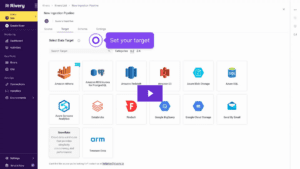We’ve written about it before in the past but 90% percent of the world’s data was created in the last two years. And every two years, the volume of data across the world doubles in size.
The explosion of data in recent years has outgrown traditional methods of management and analysis. With artificial intelligence (AI) on the rise, it’s transforming how businesses handle and derive insights from their data. In today’s world, data is the new currency, and nearly every company claims to be “data-driven.”
In this article, we’ll explore the role of AI in modern data management, the technologies fueling this shift, and the benefits and challenges that come with integrating AI into data processes.
The Role of AI in Modern Data Management
AI’s integration into data management is transforming how you collect, store, analyze, and utilize your data.
One of the significant advantages of AI in modern data management is handling huge amounts of data more efficiently and effectively than it has in the past.
Unlike traditional manual methods of categorizing data, identifying patterns, and predicting trends, AI-driven tools can now automate these tasks at a much faster pace, significantly speeding up the time it takes to derive value from data.
Arguably the most important aspect of data management is improving data quality. If stakeholders can’t trust data they are less likely to work with the data or they will blindly trust the data and make decisions from inaccurate data.
AI is playing a major role in proactively identifying and correcting data inconsistencies, duplicate values and other data inqualities that often go unnoticed by manually testing data. This enhanced accuracy offered by AI not only ensures data reliability but makes the data actionable.
Key AI Technologies Used in Data Management
Machine Learning
Machine learning is the core of AI-driven data management. It lets systems learn from data, identify patterns, and make decisions with minimal human intervention.
Companies also use machine learning to predict trends, detect anomalies, and automate data classification. Therefore, making it easier to manage large data volumes.
Natural Language Processing (NLP)
NLP is one of the most impressive aspects of AI. It enables AI systems to understand and process human language, which allows for more intuitive data management.
If you analyze unstructured data—emails, documents, and social media posts—NLP helps you extract valuable insights and automate processes like data entry and categorization.
Deep Learning
Deep learning, a subset of machine learning, uses neural networks to analyze complex data sets. It’s useful for image recognition, speech processing, and large-scale data analytics.
Likewise, deep learning enhances data management by providing more accurate and detailed insights, which can be used for decision-making and strategy development.
Robotic Process Automation (RPA)
RPA automates repetitive tasks in data management, such as data entry, cleansing, and migration. In turn, RPA reduces the time and effort required for data management. You can therefore focus on more strategic activities.
8 Business Benefits of AI in Data Management
AI offers numerous benefits to businesses, particularly in data management. Here are five key advantages:
1. Improved Data Quality
AI enhances data quality by automatically identifying and correcting errors, inconsistencies, and duplicates.
Machine learning algorithms can detect anomalies and ensure that data is accurate, consistent, and reliable. This leads to better decision-making and reduces the risk of errors in business operations.
2. Enhanced Data Integration
AI facilitates the integration of data from multiple sources, making it easier to create a unified view of the organization’s data. This is particularly important in today’s multi-cloud and hybrid environments, where data is often spread across different platforms.
AI-driven data integration ensures that data is harmonized, providing a complete and accurate picture of the business.
3. Improved Entity Resolution
Entity resolution is the process of identifying and linking records that refer to the same entity across different data sources. AI improves entity resolution by using advanced algorithms to match and merge records, even when there are variations in the data.
This enhances the accuracy of customer profiles, financial records, and other critical business data.
4. Faster Time to Insights
AI accelerates the process of deriving insights from data by automating data preparation, analysis, and reporting. This enables businesses to make faster, data-driven decisions, reducing time-to-market and increasing agility.
The ability to quickly gain insights also allows companies to respond to market changes more effectively.
5. Advanced Analytics and Insights
AI-powered analytics provide deeper insights by analyzing large and complex data sets. These insights can reveal hidden patterns, trends, and correlations that traditional analytics might miss.
Advanced AI analytics support more informed decision-making, helping businesses to optimize operations, reduce costs, and increase revenue.
6. Data Governance and Compliance
Data governance and compliance are critical problems—especially with increasing regulations like GDPR and CCPA. Fortunately, AI can automate the enforcement of data governance policies, which guarantees you meet data regulatory requirements.
AI-powered tools can also continuously monitor data usage and access patterns, identify potential compliance violations, and generate audit trails. This approach reduces the risk of fines and penalties; it also builds trust with customers.
7. Metadata Management and Data Discovery
Managing and utilizing metadata (data about data) is essential for efficient data management. AI can automate the generation, management, and utilization of metadata, which makes it easier for organizations to discover, categorize, and understand their data assets.
AI-driven metadata management tools can automatically tag and classify data based on content, context, and usage patterns.
This enhances data discoverability, making it easier for users to find and leverage the right data for their needs—leading to more informed decision-making and efficient operations.
8. Data Security and Privacy
AI now plays a critical role in securing sensitive data and privacy by using AI-driven security systems. They can detect and respond to threats in real time by analyzing patterns and anomalies across vast datasets.
These systems can also identify potential vulnerabilities, predict malicious activities, and automatically initiate protective measures—such as encryption or access restrictions.
Additionally, AI can implement privacy-preserving techniques, like differential privacy, which allows you to analyze data without compromising privacy.
How Can AI Transform Data Management?
AI’s impact on data management extends beyond automation and analytics. It is transforming the entire data management lifecycle, from data preparation to data warehousing and business intelligence.
AI-Powered Data Preparation and Cleaning
Data preparation and cleaning are critical steps in data management; they often require significant time and resources. AI automates these processes, ensuring that data is cleansed, formatted, and ready for analysis.
This reduces the time and effort required for data preparation, enabling faster and more accurate analysis.
AI in Data Integration and Transformation
AI streamlines data integration and transformation by automating the process of combining data from various sources and transforming it into a usable format.
AI-driven tools can automatically map data fields, detect relationships, and apply transformations, simplifying the integration process.
AI for Data Quality Management
Maintaining data quality is a continuous challenge for organizations. AI enhances data quality management by continuously monitoring data for errors, inconsistencies, and anomalies.
AI-powered tools can automatically correct or flag issues, ensuring that data remains accurate and reliable over time.
AI for Data Warehousing
AI optimizes data warehousing by automating tasks like data ingestion, indexing, and querying. This enables faster access to data and more efficient storage.
AI-driven data warehousing solutions can also scale dynamically and accommodate growing data volumes. For example, Snowflake uses advanced machine learning algorithms to automatically manage data clustering, optimize queries, and scale compute resources based on workload demand.
AI for Data Analytics and Business Intelligence
AI enhances data analytics and business intelligence by providing more powerful analytical tools and techniques. AI-driven analytics platforms can process large volumes of data in real time, providing actionable insights and predictive analytics.
This benefit supports more informed decision-making and helps businesses stay ahead of the competition.
Challenges Of Using AI for Data Management
Although AI offers significant benefits, it also presents challenges. As such, your business must address to leverage its potential.
Here are 6 of the main challenges:
1. Implementation Complexity
Implementing AI in data management requires substantial resources, expertise, and strategic planning. The complexity of AI solutions, including integration with existing systems and ensuring data quality, can be a barrier—especially for smaller organizations.
To manage this, you can start with small-scale pilot projects to build experience before scaling up or leveraging cloud-based AI services. This can reduce your infrastructure complexity.
2. Skill Gaps and Training
AI technologies require specialized skills and knowledge, which may not be readily available within your organization. Therefore, addressing skill gaps through training and hiring is essential for successfully implementing AI in data management.
You must also encourage collaboration between technical and business teams to align AI initiatives with your goals.
3. Cost of AI Solutions
AI solutions can be expensive, particularly for large-scale implementations. Organizations must carefully evaluate the costs and benefits of AI investments to ensure that they deliver a positive return on investment.
However, focusing on high-impact projects and exploring cost-effective options—like open-source tools or flexible pricing models—can reduce these frustrating expenses.
4. Data Privacy and Ethical Concerns
One of the biggest concerns with AI is privacy, and it’s no different with data management. AI systems in data management often require access to vast amounts of sensitive data, which raises concerns about privacy and ethics.
However, you must ensure your AI-driven processes comply with privacy regulations and ethical standards.
Your business must also implement robust data protection measures and maintain transparency about how data is used. This, however, can be challenging given the complexity of some AI algorithms.
5. Data Quality and Bias
AI systems are only as effective as the data you train them on. If the underlying data is of poor quality or biased—which is common—it can lead to inaccurate insights and decisions.
As a result, ensuring high-quality data is a considerable challenge that needs constant effort. You must also monitor and refine data sources and processes to minimize the risk of these issues.
6. Integration with Existing Systems
Integrating AI technologies with existing data management systems can be complex and time-consuming. Legacy systems may not be compatible with modern AI tools because they require substantial modifications. They may even require complete overhauls.
This challenge can create disruptions in operations, and you must plan carefully to ensure a smooth transition.
What Is The Future of AI and Data Management?
The future of AI in data management is hugely promising. AI will become more deeply embedded in data management, including automated data governance and advanced predictive modeling.
AI will also lead to more sophisticated decision-making. As AI systems develop, they can make complex decisions with minimal human intervention. This will allow your company to be more efficient and respond to changes rapidly.
AI in data management will also lead to increased collaboration between human experts and AI systems, which can lead to better overall results.
Humans will still play an important role in data management. Although AI can handle vast amounts of data and identify patterns that might go unnoticed, human intuition and strategic thinking will remain fundamental.
However, the growth of AI also poses significant challenges; for instance, the development of new tools, platforms, and methodologies can make it difficult to stay current with the latest developments.
Moving Forward
AI is transforming data management by automating processes, improving data quality, and providing deeper insights. It will play an increasingly important role in helping you manage and leverage data more effectively.
At Rivery, we are fully committed to this transformation by incorporating generative AI into our workflows and, most importantly, our product.
We’ve reimagined the next generation of data pipelines to be AI-powered. With our CoPilot, you can easily connect to any data source that has a REST API endpoint.
This means that even if we don’t offer a native connector for a specific source, we can still help you access all your data effortlessly, regardless of your level of data engineering expertise.
While Rivery is the first data integration platform with such capability, we are not stopping there and have grand plans to continue incorporating AI to help our users do more with their data.
Minimize the firefighting. Maximize ROI on pipelines.





